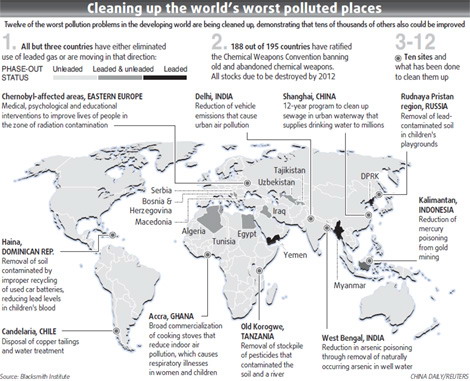
|
WORLD> Global General
 |
|
Pollution-fighters find a little success
(China Daily)
Updated: 2009-10-30 09:58 NEW YORK: Twelve of the worst pollution problems in the developing world are being cleaned up, demonstrating that tens of thousands of others also could be improved, according to a report released this week. The clean-up sites, ranging from Ukraine's Chernobyl nuclear disaster area to the polluted streets of Delhi, were in the fourth annual World's Worst Polluted Places Report issued by the US-based Blacksmith Institute and Green Cross Switzerland.
In contrast to previous years' reports, which highlighted contaminated sites or specific pollution problems, the 2009 edition focused on clean-ups and solutions. "Tens of thousands of polluted sites contaminate local populations - as many as 500 million people are poisoned each day in the developing world," the report said. "Only a few of these problems have been fixed. But it's a start and worth recognizing." The group's initial search for potential success stories yielded just 45 candidates. Making the final list were the only 12 cases that appeared to provide verifiable and credible evidence of success. "Here we are talking about successes but there's only 12 of them," Richard Fuller, president of Blacksmith Institute, told a teleconference of journalists.
Blacksmith, an international not-for-profit organization, noted global progress in areas that were not geographically specific: removing lead from gasoline, which causes neurological damage, and eliminating through international treaty obsolete chemical weapons that maim and kill. The report also listed 10 sites that have been labeled "worst polluted" and described has been done to clean them up. Indonesia seeks funds Indonesia's new environment minister said yesterday he needs more funds for law enforcement to stop illegal logging and pollution, in a bid to curb emissions by one of the world's biggest emitters of greenhouse gases. As the world's third-biggest contributor to climate change, behind the United States and China, Indonesia is seen as a key player when it comes to putting a brake on deforestation and reaching an agreement on fighting climate change. However, Environment Minister Gusti Muhammad Hatta warned that the UN climate conference in Copenhagen in December would probably fail to reach a broader global pact to fight climate change, largely because the various parties would not compromise. Curbing deforestation - which accounts for nearly a fifth of greenhouse gas pollution - by Indonesia, Brazil and tropical Africa is seen as an important step in soaking up carbon dioxide emissions. Indonesia's president, Susilo Bambang Yudhoyono, last month told the Group of 20 nations that Indonesia would cut its emissions by 26 percent by 2020, or as much as 41 percent with international funding and transfer of technology. But to achieve that kind of reduction requires funding for effective law enforcement, Hatta said.
 |